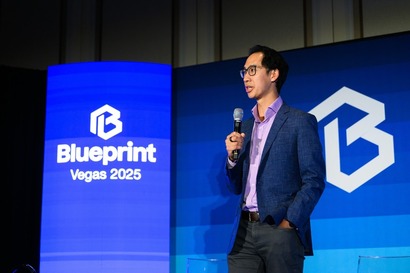Last month, RET Ventures hosted its annual Multifamily Kickoff Summit at Blueprint in Las Vegas. The event brought together leading multifamily owners and operators, technology investors, and startup executives for an afternoon of timely discussions exploring shifting industry priorities, innovations shaping the future of the space, and market dynamics influencing technology creation, demand, and adoption.

To start the Summit, RET Vice President Jameson Hartman led a conversation titled “Doing More with Less: The ROI Imperative in Multifamily Technology,” alongside expert panelists Christi Weinstein, COO at BH Properties, Elik Jaeger, CEO & Founder at SuiteSpot, Cameron Skaff, Director of Client Strategy at Funnel, and David Walther, CRO at Asset Living.
The panel explored how multifamily owners approach technology decisions in an environment where efficiency, cost savings, and ROI are front and center. Panelists discussed the growing push toward centralization, highlighting how the most successful organizations are finding ways to achieve more with leaner teams by strategically deploying tech like automation and AI. A key takeaway from the conversation was that the true ROI of a solution depends not only on financial savings but on how well solutions align with existing workflows and empower teams to operate more effectively.
Next, RET Vice President Jaymie Fung Bingham moderated “From Data to Action: Bridging the Gap for True AI Integration,” wit insights from David Stifter, CEO & Co-Founder at PredictAP, Scott Pechersky, CTO at RPM Living, and Ian Andrews, SVP at Avanti Residential.


The discussion centered on how the industry can move beyond surface-level AI adoption to achieve real operational impact. Panelists agreed that while AI has made significant progress in real estate, true success requires connecting insights to execution. They explored how better data integration, workflow automation, and inter-system communication are essential for making AI actionable and turning analysis into tangible results.

Rounding out the event, RET Managing Partner Christopher Yip led “Investing in the Future of Multifamily Technology,” alongside panelists Kyle Johnson, VP at Volition Capital, Steve Biringer, VP of Strategy at AppFolio, Roman Pedan, CEO & Founder at Kasa, and Brandon Tobman, CEO at GetCovered.
This conversation offered a candid look at how investors and founders are navigating a maturing proptech market. The panel examined the nuances of investing in multifamily technology, where long sales cycles, integration requirements, and operator-driven feedback loops shape valuation and product development. Panelists agreed that the most promising startups are those solving real operational pain points, building measurable value for owners, and demonstrating the discipline to scale sustainably in a tighter capital environment.


In addition to the discussions at the Multifamily Summit, RET Principal Aaron Ru joined Blueprint’s SFR & BTR Summit to moderate “Scaling Smarter: Unlocking Operational Efficiency in SFR” with experts Bo Lais, CEO & Co-Founder at Lula, Jackie Lee, CEO at Brandywine Homes USA, Alex Fahsel, CEO & Co-Founder at Property Shield, and Ed Wagner, Sr. Director of Engineering at Invitation Homes.
The session explored how technology is helping SFR operators scale portfolios efficiently while improving the resident experience. Panelists shared how innovations in maintenance, leasing, and acquisition are driving performance gains across geographically dispersed assets, underscoring how tech-enabled operations are essential for the sector’s continued growth.
The Bottom Line: As the multifamily and SFR sectors continue to evolve, one theme was clear throughout the conference: technology adoption is entering a more focused, results-driven phase. Operators and investors are looking beyond hype to find tools that deliver measurable ROI, streamline operations, and enhance the resident experience. RET Ventures remains committed to driving that progress by bridging the gap between innovation and real-world application, helping shape the technologies that are defining the future of the real estate industry.











